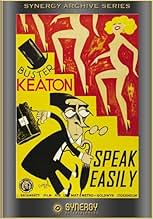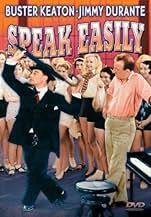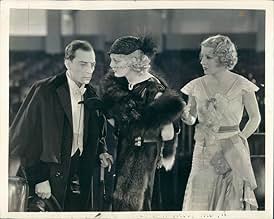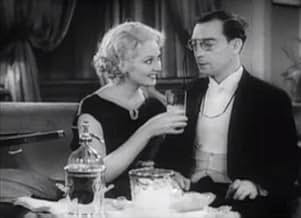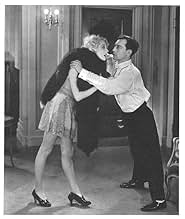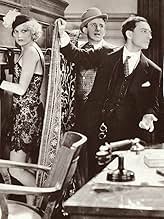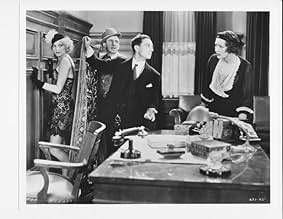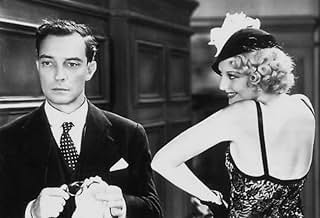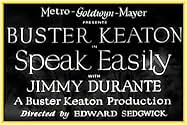IMDb RATING
5.8/10
1.2K
YOUR RATING
A timid professor inherits a large sum of money and decides to fund a terrible musical.A timid professor inherits a large sum of money and decides to fund a terrible musical.A timid professor inherits a large sum of money and decides to fund a terrible musical.
Loretta Andrews
- Chorus Girl
- (uncredited)
Oscar Apfel
- Lawyer's Representative
- (uncredited)
Reginald Barlow
- Billington
- (uncredited)
Jack Baxley
- Tom - Sheriff's Deputy
- (uncredited)
Sidney Bracey
- Jenkins
- (uncredited)
Jim Farley
- Station Agent
- (uncredited)
DeWitt Jennings
- Sheriff of Lincoln County
- (uncredited)
Fred Kelsey
- Process Server
- (uncredited)
- Director
- Writer
- All cast & crew
- Production, box office & more at IMDbPro
Featured reviews
Despite what other users have said about this movie, I found it delightful and very funny. Buster Keaton plays a college professor who thinks he has become a rich man. He decides to invest money in a bad show because he likes one of the girls in the show, and he takes the show to Broadway. Buster Keaton has a very nice speaking voice, and this is the first "talkie" of his that I have seen. Of note also in the film is Thelma Todd. She plays a golddigger, but her performance is very funny and holds up today just as well as it did then. The scene where she and Keaton get drunk I found hysterical.
Not laugh out loud funny, by still mildly amusing and lighthearted tale of an introverted professor whose supposedly inherited a fortune and decides to bankroll an inept broadway play until his fortune attracts the attention of a tenacious gold-digger (Todd).
Keaton's antics are subdued here appearing as the straight man to Durante's comic antics, whilst there's ample support from future 'Charlie Chan' Toler as the besieged stage director, and vivacious Thelma Todd as the would-be wife who sees an opportunity to secure acting fame and fortune via the cashed-up Keaton. Their drunken apartment liaison is probably the film's highlight, elsewhere proceedings sometimes become tedious and trivial despite a straightforward plot.
Mild romantic comedy doesn't become too ambitious, playing the formula sufficiently well to entertain despite some occasional pacing problems, 6/10.
Keaton's antics are subdued here appearing as the straight man to Durante's comic antics, whilst there's ample support from future 'Charlie Chan' Toler as the besieged stage director, and vivacious Thelma Todd as the would-be wife who sees an opportunity to secure acting fame and fortune via the cashed-up Keaton. Their drunken apartment liaison is probably the film's highlight, elsewhere proceedings sometimes become tedious and trivial despite a straightforward plot.
Mild romantic comedy doesn't become too ambitious, playing the formula sufficiently well to entertain despite some occasional pacing problems, 6/10.
Keaton fans, you will not "die a thousand deaths" if you view this. Nothing Keaton does is bad, if for nothing else then for his presence. That being said, Buster was a silent start who was best when doing stuff created by his own mind. By 1932, the silent era was dead and the studios owned the movies. That Buster Keaton of "Seven Chances" and "Steamboat Bill Jr." was no more. That could never be recreated.
Times changed, films changed, and Buster adapted. Better this Buster than no Buster.
The story is funny, and there is some amusing slapstick. Buster plays his role well, adds some Buster to it, and is believable as a clueless college professor. Jimmy Durante is larger than life, in a hammy sort of way, but it's a good contrast with Keaton if anything. The movie works, and the closing scenes the show on Broadway is madcap with a modicum of brilliance.
We can ask what if. What if the silent era had never ended? What if Keaton and Arbuckle had not been separated so suddenly? What if the studios had taken over the industry with their formulae? Look, this is a pretty good film. It's not Keaton being tragically reduced to nothing. (Such was never possible! The great ones always adapt.) The tragedy is what happened to Roscoe Arbuckle. What happened to Buster? He hung in there and made people laugh.
Times changed, films changed, and Buster adapted. Better this Buster than no Buster.
The story is funny, and there is some amusing slapstick. Buster plays his role well, adds some Buster to it, and is believable as a clueless college professor. Jimmy Durante is larger than life, in a hammy sort of way, but it's a good contrast with Keaton if anything. The movie works, and the closing scenes the show on Broadway is madcap with a modicum of brilliance.
We can ask what if. What if the silent era had never ended? What if Keaton and Arbuckle had not been separated so suddenly? What if the studios had taken over the industry with their formulae? Look, this is a pretty good film. It's not Keaton being tragically reduced to nothing. (Such was never possible! The great ones always adapt.) The tragedy is what happened to Roscoe Arbuckle. What happened to Buster? He hung in there and made people laugh.
There have been a lot of very perceptive comments made by previous reviewers and I don't have much to add.
I have to agree with those who said it was a rather flat comedy with flashes of wit and charm.
Keaton gives an interesting performance as Professor Post. It seems a bit of a parody on Harold Lloyd, but also a precursor to Danny Kay's professor character. The movie is wise when it centers itself around him, but it seems that the scriptwriter wrote it for Keaton to improvise wildly, only to find Keaton sticking to the script. I imagine there was some tension between him and the director, with Keaton simply giving in and following the director's orders.
Thelma Todd stands out. She lights up the screen and exudes a knowing sophistication that only a few other actresses (Jean Harlow, Mae West and Katherine Hepburn) reached.
Again, I don't think that anybody but Buster Keaton fans will enjoy the movie and only Buster Keaton fans will have a few laughs out of it.
I have to agree with those who said it was a rather flat comedy with flashes of wit and charm.
Keaton gives an interesting performance as Professor Post. It seems a bit of a parody on Harold Lloyd, but also a precursor to Danny Kay's professor character. The movie is wise when it centers itself around him, but it seems that the scriptwriter wrote it for Keaton to improvise wildly, only to find Keaton sticking to the script. I imagine there was some tension between him and the director, with Keaton simply giving in and following the director's orders.
Thelma Todd stands out. She lights up the screen and exudes a knowing sophistication that only a few other actresses (Jean Harlow, Mae West and Katherine Hepburn) reached.
Again, I don't think that anybody but Buster Keaton fans will enjoy the movie and only Buster Keaton fans will have a few laughs out of it.
SPEAK EASILY (Metro-Goldwyn-Mayer, 1932), directed by Edward Segwick, stars Buster Keaton in one of his better sound comedies for the studio. Still unable to recapture the creativity and wit from his silent movie days of the 1920s, SPEAK EASILY did manage to resort Buster back to character-type of old as a good-natured half- wit, this time with the comedy support of Jimmy Durante. For their second of three movies as a team, though here more basically as partners, it allows each to perform their individual styles before joining forces together for the climax.
Taken from the story by Clarence Budington Kelland, the plot introduces Timoleon Zanders-Post (Buster Keaton) as a professor at Potts College, whose life is a lonely one. Aside from his classroom teachings, he has no friends nor any outside interests. His servant, Jenkins (Sidney Bracey), advises him to go out into the world and find life. After getting a bogus telegram of he inheriting $750,000, the Professor quits his job, cleans out his bank account, and goes out to enjoy life, even if he has to buy it. While on board a train bound for Chicago, the professor encounters James Dodge (Jimmy Durante), a member of the a theatrical troupe called The Midnight Maids Company. Also in the troupe are a would-be actress and dancer named Pansy Peets (Ruth Selwyn) and her stage mother (Hedda Hopper), Reno (Edward Brophy); among others. Because the troupe is in financial straits, the Professor offers to pay off its back dues. By doing this, he is made manager of the company. Taking the show titled "Speak Easily" to New York City for a tryout, its stage director, (Sidney Toler), calls it the worst show he's ever seen in his 30 years on Broadway. During the course of the story, the professor falls victim to another member of the troupe, a vamp named Eleanor Espere (Thelma Todd), while comedian James tries to make his witless jokes funny. Problems arise on opening night when a summons man (Fred Kelsey) comes to the theater with an injunction to close the show because of the professor's mythical inheritance.
With the title being a parody of bars at the time called a "Speakeasy," SPEAK EASILY might have been a title used for a Three Stooges comedy short, but turns out to be one for MGM's 80 minute feature. The roles of both Buster Keaton and Jimmy Durante are difficult since it calls for both to be acceptable and likable through their comedy performances. Before Clifton Webb made being serious funny in his movies of the 1950s, Buster Keaton does so here playing a no- nonsense yet shy professor, dignified with glasses, speaking in high vocabulary words and always carrying an umbrella for a rainy day. As in his previous MGM efforts, Buster often acts confused and resorts to occasional pratfalls. Co-star, Jimmy Durante, is completely opposite. He's outgoing, confident and obnoxiously talkative. He often tries getting laughs through his unfunny jokes but does get the love of his audience through his traditional piano playing songs communicating with the camera through his eyes. Durante does have a memorable scene that was later clipped in THAT'S ENTERTAINMENT (1974) as he plays the piano to stage director (wonderfully played by pre "Charlie Chan" actor Sidney Toler) introducing his latest composition of "Singing in the Rain," a song originally introduced in 1929, which for 1932, be far from original. Other moments of comedy include one at the train station mishap involving Buster's trunk and later the baby of a stereotypical Italian couple, Tony (Henry Armetta and Rosa (Inez Palage); Thelma Todd's vamping Buster and each getting drunk should have been funnier than played; and the climatic show where everything goes wrong. Also included are songs such as: "Good Times Are Here Now," "I Could Do Without Broadway" (sung by Jimmy Durante) and "Speak Easily."
Built upon the premise of an outsider taking part of show business, SPEAK EASILY is a kind of attraction to hold an audience attention, mainly due to total opposites as Keaton and Durante taking the limelight separately or together. Otherwise, just another MGM comedy that tries hard to become a comedy classic. Distributed on video cassette in the 1990s, and later DVD, availability on cable television is often found these days on Turner Classic Movies. (**1/2)
Taken from the story by Clarence Budington Kelland, the plot introduces Timoleon Zanders-Post (Buster Keaton) as a professor at Potts College, whose life is a lonely one. Aside from his classroom teachings, he has no friends nor any outside interests. His servant, Jenkins (Sidney Bracey), advises him to go out into the world and find life. After getting a bogus telegram of he inheriting $750,000, the Professor quits his job, cleans out his bank account, and goes out to enjoy life, even if he has to buy it. While on board a train bound for Chicago, the professor encounters James Dodge (Jimmy Durante), a member of the a theatrical troupe called The Midnight Maids Company. Also in the troupe are a would-be actress and dancer named Pansy Peets (Ruth Selwyn) and her stage mother (Hedda Hopper), Reno (Edward Brophy); among others. Because the troupe is in financial straits, the Professor offers to pay off its back dues. By doing this, he is made manager of the company. Taking the show titled "Speak Easily" to New York City for a tryout, its stage director, (Sidney Toler), calls it the worst show he's ever seen in his 30 years on Broadway. During the course of the story, the professor falls victim to another member of the troupe, a vamp named Eleanor Espere (Thelma Todd), while comedian James tries to make his witless jokes funny. Problems arise on opening night when a summons man (Fred Kelsey) comes to the theater with an injunction to close the show because of the professor's mythical inheritance.
With the title being a parody of bars at the time called a "Speakeasy," SPEAK EASILY might have been a title used for a Three Stooges comedy short, but turns out to be one for MGM's 80 minute feature. The roles of both Buster Keaton and Jimmy Durante are difficult since it calls for both to be acceptable and likable through their comedy performances. Before Clifton Webb made being serious funny in his movies of the 1950s, Buster Keaton does so here playing a no- nonsense yet shy professor, dignified with glasses, speaking in high vocabulary words and always carrying an umbrella for a rainy day. As in his previous MGM efforts, Buster often acts confused and resorts to occasional pratfalls. Co-star, Jimmy Durante, is completely opposite. He's outgoing, confident and obnoxiously talkative. He often tries getting laughs through his unfunny jokes but does get the love of his audience through his traditional piano playing songs communicating with the camera through his eyes. Durante does have a memorable scene that was later clipped in THAT'S ENTERTAINMENT (1974) as he plays the piano to stage director (wonderfully played by pre "Charlie Chan" actor Sidney Toler) introducing his latest composition of "Singing in the Rain," a song originally introduced in 1929, which for 1932, be far from original. Other moments of comedy include one at the train station mishap involving Buster's trunk and later the baby of a stereotypical Italian couple, Tony (Henry Armetta and Rosa (Inez Palage); Thelma Todd's vamping Buster and each getting drunk should have been funnier than played; and the climatic show where everything goes wrong. Also included are songs such as: "Good Times Are Here Now," "I Could Do Without Broadway" (sung by Jimmy Durante) and "Speak Easily."
Built upon the premise of an outsider taking part of show business, SPEAK EASILY is a kind of attraction to hold an audience attention, mainly due to total opposites as Keaton and Durante taking the limelight separately or together. Otherwise, just another MGM comedy that tries hard to become a comedy classic. Distributed on video cassette in the 1990s, and later DVD, availability on cable television is often found these days on Turner Classic Movies. (**1/2)
Did you know
- TriviaSecond of three films in MGM's pairing of Buster Keaton and Jimmy Durante as a comedy team. The other pictures were The Passionate Plumber (1932) and Le roi de la bière (1933).
- GoofsWhile Professor Post (Buster Keaton) is dragged by the train, clutching his luggage, his hat flies off and he is unable to grab it. In the next shot, his hat is once again firmly on his head.
- Quotes
Eleanor Espere: Tell me, Timmy. Have you ever seriously thought of marriage?
Professor Post: Yes... that's why I'm single.
- ConnectionsFeatured in Il était une fois Hollywood (1974)
- SoundtracksGood Times Are Here Again
(1932) (uncredited)
Music by David Snell and Charles Maxwell
Lyrics by Samuel Marx
In the score during the opening credits and at the end
Played on piano by Jimmy Durante and sung by the chorus at the opera house
Played often in the score
Details
- Release date
- Country of origin
- Language
- Also known as
- Les millions qui tombent du ciel
- Filming locations
- Chatsworth Depot, Chatsworth, California, USA(train station)
- Production company
- See more company credits at IMDbPro
- Runtime1 hour 22 minutes
- Color
- Aspect ratio
- 1.37 : 1
Contribute to this page
Suggest an edit or add missing content


